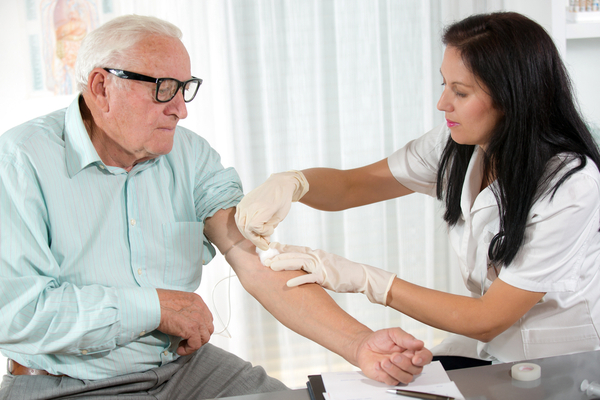What are the parameters of Jewish law for medical professionals treating their parents?
By Rabbi Ari Enkin, Rabbinic Director, United with Israel
The Torah tell us, “Anyone who wounds their father or mother is to be put to death.”
We see from here that it is an especially severe transgression for a child to wound a parent. This is true even when the wound is minimal and even when it is made for a beneficial purpose.
A wound is defined as causing bleeding and, according to some sources, it even includes causing a bruise.
As such, there is much discussion in halacha (Torah law) on the permissibility of a child who is a doctor or dentist, for example, to treat a parent. What about a lab technician who draws blood based on a doctor’s orders? May a child draw the blood?
The Talmud cites two opinions on the matter.
According to the first opinion, a child is permitted to treat a parent even if it will cause bleeding. It is argued that the ban on wounding a parent does not apply when it is done for a lawful purpose, such as for a needed or beneficial medical procedure. This is based on the rule of “ve’ahavta l’reiacha kamocha” (to love your friend like yourself).
It is explained that when the Torah forbids a child to wound a parent, it only means that it is forbidden when done with evil intent. If, however, a parent wishes to be treated by a child, it is permitted, even if it will result in bleeding.
According to the second opinion, it is absolutely forbidden for a child to do anything that could cause a parent to bleed.
This includes removing a splinter or draining blood from a boil, no matter what the reason for it is. According to this approach, causing a parent to bleed for any reason is forbidden no matter why it is being done. There is a difference of opinion whether a child may cut the hair or nails of a parent – activities which rarely cause bleeding although bleeding is possible.
Getting down to practical Jewish law, the Code of Jewish law rules that it is forbidden for a child to treat a parent if there is any risk that bleeding might occur. This is true even when there is nobody else available to perform the procedure.
Rabbi Moses Isserles, the authority for Ashkenazi Jews, disagrees and permits a child to treat his parent when “nobody else is available to do so.” Although it is certainly best to avoid the issue entirely by arranging for a different health care provider to perform the needed procedure, normative halacha ultimately allows a child to perform the procedure in accordance with the Rema when absolutely necessary.
There are, however, a number of interpretations as to what is defined as “nobody else is available to do so.”
According to some authorities, “nobody else is available to do so” includes a situation where there are others who could perform the procedure on the parent, and are completely competent to do so, but the child is more qualified to do so.
Other authorities allow a child to perform medical procedures on the parent merely if the parent simply prefers that the child do so. This is true even if the child is not necessarily the best or most qualified.
There is also an opinion that a child may treat a parent at home if doing so will keep the parent from having to be admitted to a hospital.
There is much discussion if a child may treat a parent where the consideration is completely financial in nature.
For example, is the family required to pay a doctor or other health care worker to perform a needed procedure if the son could do it for free?
Some authorities allow a child to treat a parent in order to save money from having to hire someone else. Others argue that financial considerations alone do not justify a child treating a parent. Indeed, a person is obligated to spend money to perform mitzvot or to avoid transgressing prohibitions.
According to the view that one must spend money in order to avoid having a child treat a parent, there is a difference of opinion whether it is the child or the parent who must bear the costs of hiring someone else to perform the procedure.
